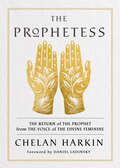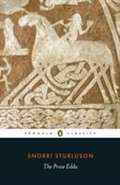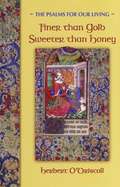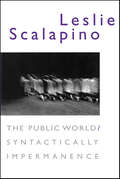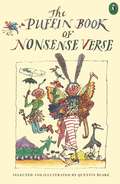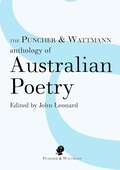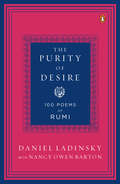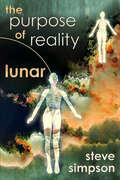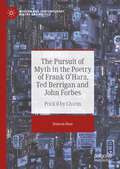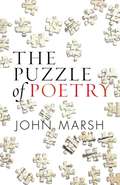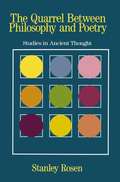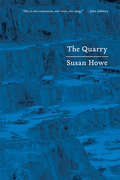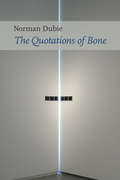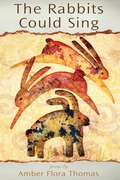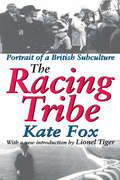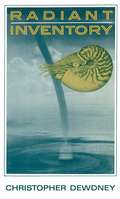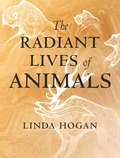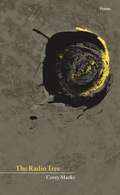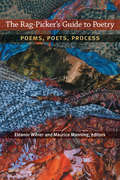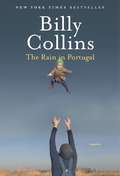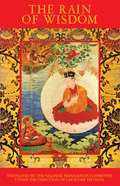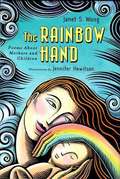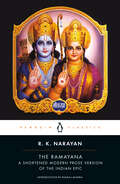- Table View
- List View
The Prophetess: The Return of The Prophet from the Voice of The Divine Feminine
by Chelan HarkinA powerful retelling and continuation of Kahlil Gilbran's The Prophet, this book of prose poetry examines life's deeper meaning and spirituality with the Divine Feminine as a guide.The Prophetess is a modern take on Kahlil Gibran&’s classic 1923 book, The Prophet. The beautiful verse explores the power and timeless wisdom of the Divine Feminine. The Prophetess invites readers into the core of life&’s most meaningful subjects and offers a taste of a more spiritually fulfilling way to relate to ourselves and the world. This book boldly and astutely encourages the creative redefinition of old patterns of thought that our lives may more closely align with beauty and truth. The Prophetess offers permission to explore a new paradigm characterized by acknowledgment of our light, the claiming of our gifts, and the embrace of our wholeness.
The Prose Edda: Norse Mythology
by Jesse L. Byock Snorri SturlusonDesigned as a handbook for poets to compose in the style of the skalds of the Viking ages. It is an exposition of the rule of poetic diction with many examples, applications and retellings of myths and legends.
The Psalms
by Herbert O'DriscollThe psalms are among the most sublime poetry in the world, offering us inexhaustible wells of meaning. Herbert O'Driscoll adeptly dips into their sacred depths and draws up sparkling insights to refresh the soul. <P><P>Our contemporary spirits can feel at home in the world of psalms. All of human experience is there - joy and sadness, love and anger, trust and despair. The gift of the psalms lies in their challenge to us; they invite us into dialogue with them and with the God who inspired them. <P><P>The psalms guide us to express our deepest feelings to God, and their response floods the soul with assurance. Justice is done. Healing takes place. Grace is given. Praise for God with Us: The Companionship of Jesus in the Challenges of Life: "God with Us, approached in a spirit of openness and honesty, can be transforming. Its thought is deep but its language is accessible - written with sensitivity and spirituality." -Montreal Anglican
The Public World/Syntactically Impermanence: Syntactically Impermanence
by Leslie ScalapinoThe Public World / Syntactically Impermanence is a brilliant consideration of the strategies of poetry, and the similarities between early Zen thought and some American avant-garde writings that counter the "language of determinateness," or conventions of perception. The theme of the essays is poetic language which critiques itself, recognizing its own conceptual formations of private and social, the form or syntax of the language being "syntactically impermanence."Whether writing reflexively on her own poetry or looking closely at the writing of her peers, Leslie Scalapino makes us aware of the split between commentary (discourse and interpretation) and interior experience. The "poetry" in the collection is both commentary and interior experience at once. She argues that poetry is perhaps most deeply political when it is an expression that is not recognized or readily comprehensible as discourse.
The Puffin Book of Nonsense Verse
by Quentin BlakeEver eaten Poodle Strudel? Slain a Jabberwock? Bathed in Irish Stew? Quentin Blake is one of the best loved of children’s illustrators. In this brilliant book he has selected and illustrated his favourite comic verse, making it pure entertainment for nonsense-lovers of all ages. His unique style of drawing brings a new perspective to every poem. Classic writers such as Lewis Carroll and Edward Lear are combined with more contemporary talents such as Roger McGough, Margaret Mahy and Russell Hoban. With fifteen wonderfully absurd sections, including Distracting Creatures, Sticky Ends, I Wish I Were a Jelly Fish, A Recipe for Indigestion and Chortling and Galumphing, here is a delightful collection of the topsy-turvy, the fantastical, the anarchic, the illogical and the utterly wonderful.
The Puncher And Wattmann Anthology Of Australian Poetry
by John LeonardThe rich diversity of Australian poetry stands in no need of makeovers or prescriptions. What will benefit it is attentive and brilliant readers, of whom John Leonard is without doubt one of its finest. - Martin Harrison This anthology realigns Australian poetry from a 21st century perspective, with a selection from a wide range of living poets as well as familiar voices from the past. There is an emphasis on social observation and personal experience of Australia's changing history that gives new context to poetry by previous generations from Wright and Hope through Lawson and Paterson to Harpur, Kendall and the poets of early settlement. - Susan Lever Two centuries of poetic achievement demonstrating - no, crying out full-throatedly - that it is our poets who manifest 'a pungent awareness that language is an inheritance we accept for alteration and renewal.' This selection is panoramic, but it also has a depth and a thoughtfulness in its clusters of poems by 164 original, funny, perplexing, and gifted poets. If you love poetry, this book will amplify that love; and if you are a teacher or student of poetry, read this anthology over and over. - Lyn McCredden
The Purity of Desire: 100 Poems of Rumi
by Daniel Ladinsky Nancy Owen Barton Mevlana Jalaluddin RumiThe first full-length volume of Rumi's cherished verse by bestselling poet Daniel Ladinsky Renowned for his poignant renderings of Hafiz's mystical texts, Daniel Ladinsky captures the beauty, intimacy, and musicality of another of Islam's most beloved poets and spiritual thinkers. In collaboration here with Nancy Owen Barton, and with learned insight and a delicate touch, they explore the nuances of desire--that universal emotion--in verse inspired by Rumi's love and admiration for his companion and spiritual teacher, Shams-e Tabriz. These poems thoughtfully capture the compelling wisdom of one of Islam's most revered artistic and religious voices and one of the most widely read poets in the English language.
The Purpose of Reality: Lunar (The Purpose of Reality #2)
by Steve SimpsonSteve Simpson's remarkable collection of poetry and illustrations is dream-like, playful and wildly inventive. Here is a selection of the beings within:The detective, who carelessly morphs into birds and insects, and cannot choose between brooding and moping, until a stylish grayscale client with retrolescent highlights appears.Proteus, Homo Sapiens Beta, who discovered fire and put it out, who created a rudimentary encyclopedia that he pedaled across Gondwanaland on weekends.Millie, the intrepid librarian, unperturbed by the Dark Solarian or the fearsome kilowasp, who insists that her underlings pay for bibliotactical losses.The adorable Deija Vitro, Martian Princess of Glass, whose fans line the streets waving Windex spray. Wollongong will never be the same, because her armies have razed it to the ground. “No one will miss it,” she reassured an infatuated follower.
The Pursuit of Myth in the Poetry of Frank O'Hara, Ted Berrigan and John Forbes: Prick'd by Charm (Modern and Contemporary Poetry and Poetics)
by Duncan HoseThe Pursuit of Myth in the Poetry of Frank O'Hara, Ted Berrigan and John Forbes traces a tradition of revolutionary self-mythologising in the lives and works of Frank O’Hara, Ted Berrigan and John Forbes, as a significant trefoil in twentieth-century English language poetry. All three had untimely deaths, excited a collective homage, and developed cult followings that reverberate today. This book tracks the transmission of the poem as charm, the poet as charmer, and the reinstitution of troubadour erotics as a kind of social poetics. Starting with Orpheus, the book refreshes the myth of the poet as mythmaker, examining how myths of “self” and “nation” are regenerated for the twenty-first century and how persons-as-myths are made in community through coteries of artists and beyond. Duncan Bruce Hose’s critical vocabulary, with its nucleus of mythos, searches the edges of phenomenal enquiry, closing in on the work of “glamour”, “aura”, “charm”, “possession”, “phantasm”, the “daemonic”, and the logic of haunting in the continuing being of these three poets as “charismatic animals”.
The Puzzle of Poetry
by John MarshThe Puzzle of Poetry offers students a readable, reliable guide to understanding poetry. Instead of carving poems up into their elements, The Puzzle of Poetry describes how experienced readers of poems go about understanding them. Each line, sentence, or syntactical unit in a poem is a clue to the “puzzle.” As with crossword puzzles, figuring out the answer to one clue can help you figure out the answer to others. This book teaches the reader to check what they know in a poem against what else they know to find meaning, a systematic but creative approach that can help language to come alive. <p><p> Each chapter contains a lively and personal discussion of one part of the art of reading poetry; a short guide to writing about poetry is also included. The book introduces students to a variety of poems, from Anglo-Saxon verse to Hamilton and Jay-Z.
The Quarrel Between Philosophy and Poetry: Studies in Ancient Thought
by Stanley RosenThe Quarrel Between Philosophy and Poetry focuses on the theoretical and practical suppositions of the long-standing conflict between philosophy and poetry. Stanley Rosen--one of the leading Plato scholars of our day--examines philosophical activity, questioning whether technical philosophy is a species of poetry, a political program, an interpretation of human existence according to the ideas of 19th and 20th-century thinkers, or a contemplation of beings and Being.
The Quarry: Essays
by Susan HoweThe Quarry presents new and pivotal Susan Howe prose pieces. A powerful selection of Susan Howe's key essays, The Quarry moves backward chronologically, from her brand-new "Vagrancy in the Park" (about Wallace Stevens) through essential texts such as "The Disappearance Approach," "Personal Narrative," "Sorting Facts; or, 47 Ways of Looking at Chris Marker," "Frame Structures," and "Where Should the Commander Be" to end with her seminal early art criticism, "The End of Art."
The Quotations of Bone
by Norman Dubie"Norman Dubie is one of our premier poets."-The New York Times"Dubie's poems are unmatched in their incandescent imaginings, gorgeous language, and fearless tracking of the inexorably turning wheel of existence."-Booklist"Dubie [is] one of the most powerful and influential American poets."-The Washington PostIn his twenty-ninth collection of poems, Norman Dubie returns to a rich, color-soaked vision of the world. Strangeness becomes a parable for compassion, each poem leading the reader to an uncommon way of understanding human capacities. In the futuristic sphere of The Quotation of Bone, the mind wanders meditatively into an imaginative and uncontainable history.The Quotations of BoneThe meal of bone was a soured milk-just the heads of giant elkin a dark circle looking downon a wooden bowl of soda crackersand pork. One large kniferesting in the meatof a woodsman's calloused hand.He grins at his womanwho is slowly poisoning himwith the stringy resins of morning glory.A tasteless turpentine with pink pig.The speeches of boneare matrimonial in early autumn-by January there's a froth of bloodat a nostril.He thinks a long icicle is buried in his ear.She thinks D. H. Lawrence was a grim buccaneer.I hate most men. Adore the few named Lou.One small addendum:the dead elk are grinning too.Norman Dubie is a Regents professor at Arizona State University. He lives in Tempe, Arizona.
The Rabbits Could Sing: Poems (The Alaska Literary Series)
by Amber Flora ThomasThe poems included in The Rabbits Could Sing delve farther into territory that Amber Flora Thomas visited in her prize-winning book Eye of Water, showing even more clearly how “the seam has been pulled so far open on the past” that “the dress will never close.” Here, the poem acts not as a body in itself but as a garb drawn around the here and now. Loss, longing, and violation are sustenance to a spirit jarred from its animal flesh and torn apart, unsettling the reader with surprising images that are difficult to forget. The poems in The Rabbits Could Sing invite the reader into a world thick with the lush bounty of summer in the far north, where the present is never far from the shadow of the past.
The Racing Tribe: Portrait of a British Subculture
by Kate FoxIt is generally assumed that anthropologists do their research in remote and uncomfortable parts of the world--places with monsoons, mud huts, and malaria. In this volume, social anthropologist Kate Fox has taken on an altogether more enjoyable assignment, the study of the arcane world of British horseracing. For Fox, field research meant wandering around racetracks in a pink hat and high heels (standard tribal costume) rather than braving killer insects and primitive sanitation. Instead of an amorphous racing crowd, the author finds a complete subculture with its own distinctive customs, rituals, language and etiquette. Among the spectators, she identifies Horseys, Addicts, Anoraks, Pair-Bonders, Day-Outers, Suits, and Be-Seens--all united by remarkable friendliness and courtesy. Among the racing professionals, the tribal structure includes Warriors (jockeys), Shamans (trainers), Scribes (journalists), Elders (officials and stewards) and Sin-Eaters (bookies). Fox includes witty and incisive descriptions of the many strange ceremonies and rituals observed by racegoers--the Circuit Ritual, Ritual Conversations ("What do you fancy in the next?") , Celebration Rituals, the Catwalk Ritual, and Post-Mortem Rituals (naturally, a horse never loses a race because it's too slow)--and their special codes of behavior such as the Modesty Rule, the Collective Amnesia Rule, and the Code of Chivalry. The Racing Tribe is also a refreshingly candid account of anthropological fieldwork, including all the embarrassing mistakes, hiccups, short-cuts and guesswork that most social scientists keep very quiet about.
The Radiant Lives of Animals
by Linda HoganFrom a celebrated Chickasaw writer, a spiritual meditation, in prose and poetry, on our relationship to the animal world, in an illustrated gift package.Concerned that human lives and the natural world are too often defined by people who are separated from the land and its inhabitants, Indigenous writer and environmentalist Linda Hogan depicts her own intense relationships with animals as an example we all can follow to heal our souls and reconnect with the spirit of the world. From her modest forest home in Colorado, and venturing throughout the region, especially to her beloved Oklahoma, she introduces us to horses, packrats, snakes, mountain lions, elks, wolves, bees, and so many others whose presence has changed her life. In this illuminating collection of essays and poems, lightly sprinkled with elegant drawings, Hogan draws on many Native nations' ancient stories and spiritual traditions to show us that the soul exists in those delicate places where the natural world extends into human consciousness--in the mist of morning, the grass that grew a little through the night, the first warmth of this morning's sunlight. Altogether, this beautifully packaged gift is a reverential reminder for all of us to witness and appreciate the radiant lives of animals.
The Rag-Picker's Guide to Poetry: Poems, Poets, Process
by Maurice Manning Eleanor WilnerThe venture of this inviting collection is to look, from the many vantages that the 35 poets in this eclectic anthology chose to look, at what it was--knowing that a poem can't be conceived in advance of its creation--that helped their poems to emerge or connected them over time. The Rag-Picker's Guide to Poetrypermits an inside view of how poets outwit internal censors and habits of thought, showing how the meticulous and the spontaneous come together in the process of discovery. Within are contained the work and thoughts of: Betty Adcock Joan Aleshire Debra Allbery Elizabeth Arnold David Baker Rick Barot Marianne Boruch Karen Brennan Gabrielle Calvocoressi Michael Collier Carl Dennis Stuart Dischell Roger Fanning Chris Forhan Reginald Gibbons Linda Gregerson Jennifer Grotz Brooks Haxton Tony Hoagland Mark Jarman A. Van Jordan Laura Kasischke Mary Leader Dana Levin James Longenbach Thomas Lux Maurice Manning Heather McHugh Martha Rhodes Alan Shapiro Daniel Tobin Ellen Bryant Voigt Alan Williamson Eleanor Wilner C. Dale Young
The Rain in Portugal: Poems
by Billy CollinsFrom former U.S. Poet Laureate Billy Collins comes a twelfth collection of poetry offering nearly fifty new poems that showcase the generosity, wit, and imaginative play that prompted The Wall Street Journal to call him "America's favorite poet." The Rain in Portugal--a title that admits he's not much of a rhymer--sheds Collins's ironic light on such subjects as travel and art, cats and dogs, loneliness and love, beauty and death. His tones range from the whimsical--"the dogs of Minneapolis . . . / have no idea they're in Minneapolis"--to the elegiac in a reaction to the death of Seamus Heaney. A student of the everyday, here Collins contemplates a weather vane, a still life painting, the calendar, and a child lost at a beach. His imaginative fabrications have Shakespeare flying comfortably in first class and Keith Richards supporting the globe on his head. By turns entertaining, engaging, and enlightening, The Rain in Portugal amounts to another chorus of poems from one of the most respected and familiar voices in the world of American poetry. On Rhyme It's possible that a stitch in time might save as many as twelve or as few as three, and I have no trouble remembering that September has thirty days. So do June, November, and April. I like a cat wearing a chapeau or a trilby, Little Jack Horner sitting on a sofa, old men who are not from Nantucket, and how life can seem almost unreal when you are gently rowing a boat down a stream. That's why instead of recalling today that it mostly pours in Spain, I am going to picture the rain in Portugal, how it falls on the hillside vineyards, on the surface of the deep harbors where fishing boats are swaying, and in the narrow alleys of the cities where three boys in tee shirts are kicking a soccer ball in the rain, ignoring the window-cries of their mothers.
The Rain of Wisdom: The Essence of the Ocean of True Meaning
by Nalanda Translation CommitteeThe art of composing spontaneous songs that express spiritual understanding has existed in Tibet for centuries. Over a hundred of these profound songs are found in this collection of the works of the great teachers of the Kagyü lineage, known as the Practice Lineage of Tibetan Buddhism.Many readers are already familiar with the colorful life of the yogin Milarepa, an early figure in the Kagyü lineage, some of whose songs are included here. Songs by over thirty other Buddhist teachers are also presented, from those of Tilopa, the father of the lineage, to those of the Sixteenth Gyalwa Karmapa, as well as several songs by Chögyam Trungpa, the noted teacher of Buddhism in America who directed the translation of The Rain of Wisdom.The diversity of the songs mirrors the richness of Tibetan Buddhism and gives us clear portraits of some of its most eminent teachers. Their longing for truth, their heartfelt devotion, and their sense of humor are all reflected. These poems share a beauty and intensity that have made them famous in Tibetan literature. With its vivid imagery and deep insight, The Rain of Wisdom communicates a profound and timeless understanding.
The Rainbow Hand: Poem About Mothers and Children
by Janet S. WongA collection of eighteen original poems about mothers and motherhood, including "Mother's Heart," "Old Mother Chung," and "The Pilot."
The Ramayana
by R. K. NarayanRama's stepmother Kaikeyi longs to see her son Bharata crowned king, and persuades King Dasaratha that Rama, the rightful heir, should be sent into exile for fourteen years. Rama's beautiful and devoted wife Sita, and Lakshmana his inseparable half-brother, both choose to accompany him. Rama, Sita and Lakshmana live happily in the forest until the demon king Ravana is told by his sister that Sita is the most beautiful princess in the world. He decides to kidnap her, and lures her away to his kingdom in the south. Rama and Lakshmana must rescue Sita, and call on the great monkey army, led by the warrior Hanuman, to help them find her. Rama uses his time in exile to learn the true meaning of devotion and loyalty, but will the lessons earn him the reward he deserves?
